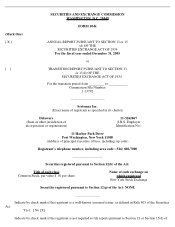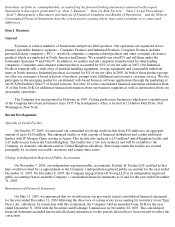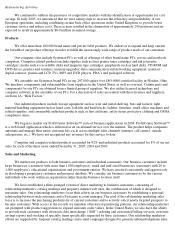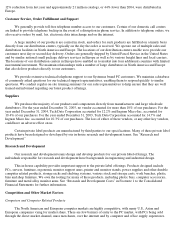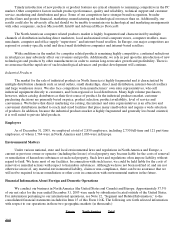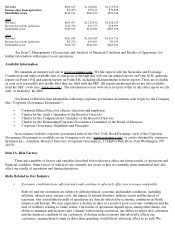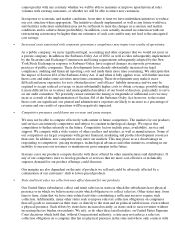Circuit City 2005 Annual Report Download - page 12
Download and view the complete annual report
Please find page 12 of the 2005 Circuit City annual report below. You can navigate through the pages in the report by either clicking on the pages listed below, or by using the keyword search tool below to find specific information within the annual report.Risks Related to Our Company
the state are through the use of interstate commerce such as the mailing of catalogs into the state and the
delivery of goods by mail or common carrier. We cannot predict whether the nature or level of contacts we
have with a particular state will be deemed enough to require us to collect sales tax in that state nor can we
be assured that Congress or individual states will not approve legislation authorizing states to impose tax
collection obligations on all direct mail and/or e-commerce transactions. A successful assertion by one or
more states that we should collect sales tax on the sale of merchandise could result in substantial tax
liabilities related to past sales and would result in considerable administrative burdens and costs for us and
may reduce demand for our products from customers in such states when we charge customers for such
taxes.
•
Business disruptions could adversely impact our revenue and financial condition.
It is our policy to insure for certain property and casualty risks consisting primarily of physical loss to
property, business interruptions resulting from property losses, workers’ compensation, comprehensive
general liability, and auto liability. Insurance coverage is obtained for catastrophic property and casualty
exposures as well as those risks required to be insured by law or contract. Although we believe that our
insurance coverage is reasonable, significant events such as acts of war and terrorism, economic conditions,
judicial decisions, legislation, natural disasters and large losses could materially affect our insurance
obligations and future expense.
• Changes in financial accounting standards may affect our results of operations.
A change in accounting standards or practices can have a significant effect on our reported results of
operations. New accounting pronouncements and interpretations of existing accounting rules and practices
have occurred and may occur in the future. Changes to existing rules, such as the adoption of Statement of
Financial Accounting Standard 123R (“SFAS 123R”), “Share-based Payment”, may adversely affect our
reported financial results. SFAS 123R will require that we measure all stock-based compensation awards
using a fair value method and record such expense, which may be significant, in our results of operations.
•
If we are unable to attain effective internal controls or remediate the existing material weaknesses in our
internal controls over financial reporting, we may not be able to report our financial results timely or
accurately and our business could suffer.
We currently have material weaknesses in internal controls over financial reporting. We previously have
had material weaknesses in internal controls over financial reporting which resulted in our filing restated
consolidated financial statements for the years ended December 31, 2004 and 2003. We are not yet subject
to the internal controls certification and attestation requirements of Section 404 of the Sarbanes-Oxley Act
of 2002 because we are not an “accelerated filer” (the market value of the public float of our shares was
less than $75 million at the end of our second fiscal quarters of 2005 and 2006). Based on SEC
implementing regulations in effect as of June 30, 2006, we will not be required to satisfy the Section 404
requirements until at least our annual report for the fiscal year ending December 31, 2007, depending on
the timing and scope of the final SEC rules implementing Section 404 for non-accelerated filers.
We have begun the process of documenting and evaluating our systems of internal control over financial
reporting. As a result of the ongoing evaluation of our internal control over financial reporting we cannot
be assured that significant deficiencies or material weaknesses would not be required to be reported in the
future. We have identified a number of deficiencies in our internal control over financial reporting. We are
working to implement remedial measures which include enhancements to eliminate these deficiencies. If
we are not able to implement the requirements of Section 404 in a timely manner or with inadequate
compliance, we might be subject to regulatory sanctions and we might suffer a loss of public confidence in
our reported financial information. Any such action could adversely affect our business and our financial
results.
• We have not filed our required financial reports on a timely basis, which could affect the trading of our
stock.


